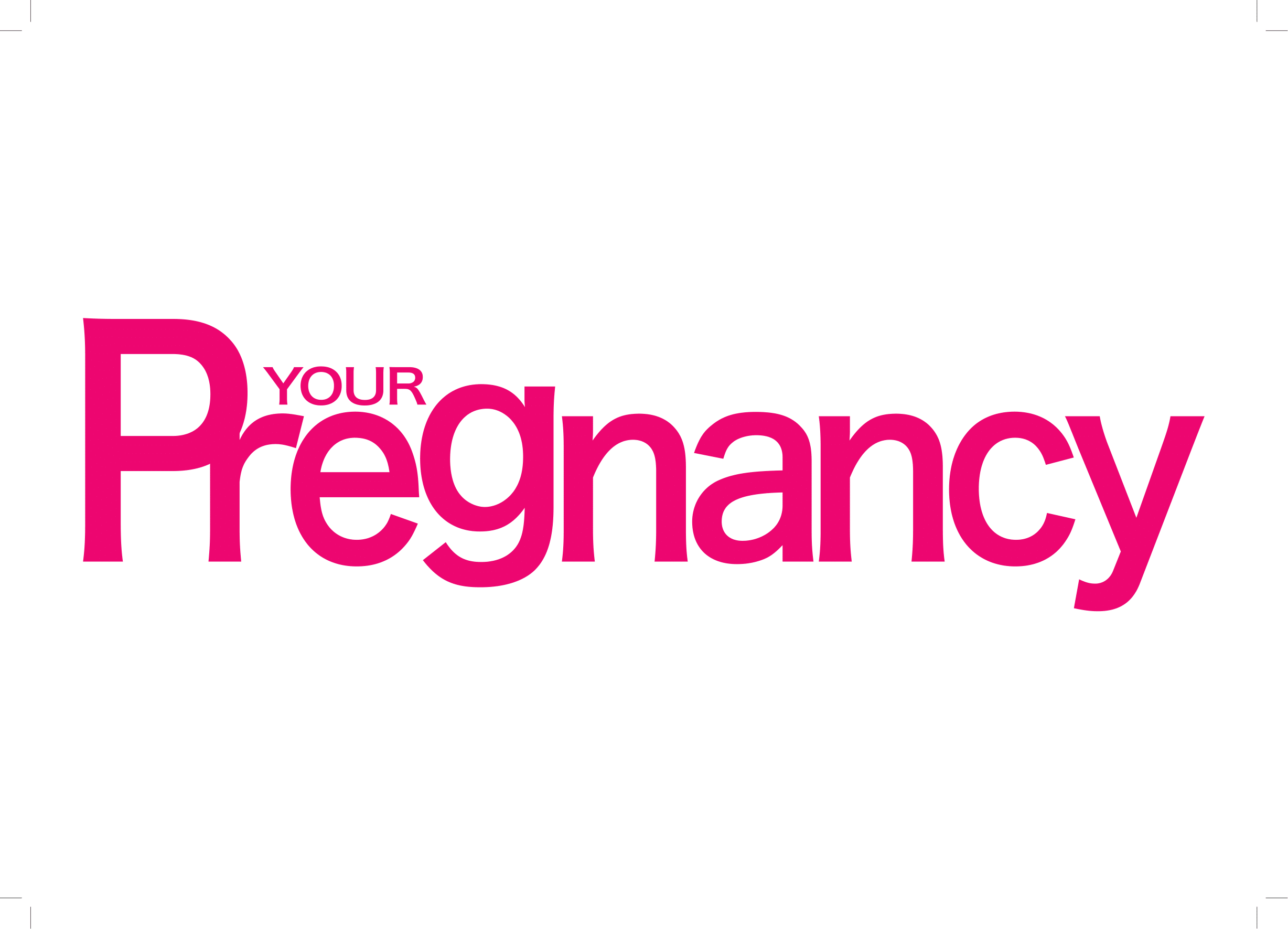
1. Confirm the pregnancy
“A positive urine pregnancy test is all you need to confirm the pregnancy,” says Cape Town obstetrician and gynaecologist, Dr Philip Zinn. “Urine tests are very sensitive and can turn positive even a day or two before the period is missed. You can do a blood test if there is any uncertainty.”
Find out: How accurate is peeing on a stick?
2. Calculate your due date
Human gestation takes 38 weeks, so you can calculate your due date by counting 40 weeks from the first day of your last period. Why?
Because conception typically occurs about two weeks after a woman’s last period begins, explains Cape Town obstetrician Dr Manasri Naiker. Most women realise they’re pregnant after they miss their next period, which means that conception took place two weeks before.
If you’re absolutely sure of the date of conception, by all means use that, and to get an exact due date, add 266 days. Remember, though, that your baby will likely make up his or her own mind exactly when to make an appearance.
Try: Due date calculator
3. Choose a caregiver and make your first appointment
If you opt for private care then you have a few choices to make. Who your prenatal caregiver will be is a highly personal choice, whether it’s an obstetrician, GP or midwife.
Your first appointment is usually scheduled for around the eight week mark. “The heartbeat is usually visible from six weeks, or two weeks after the missed period, and many doctors will schedule the first appointment after this,” says Dr Zinn.
When it comes to government hospitals, you’ll need to go to the one nearest to where you live. Or you can visit a Midwife Obstetric Unit if there is one nearby.
Either way, you will most likely give birth with the help of a midwife, unless your pregnancy runs into complications. In this situation you will be transferred to an academic training hospital. At your first appointment you will get your clinic card.
This card will be filled out at each appointment and must remain with you throughout the pregnancy. When given an appointment date, make sure to stick to it as there are long waiting lists if you miss one.
Read: Top things to discuss with your partner before conceiving
4. Make sensible lifestyle changes
You should be eating a protein-rich, high fibre diet, drinking plenty of water and getting lots of rest. If you’re underweight or overweight, start a healthy eating plan or see a dietician to plan the best diet for you and your pregnancy.
“Alcohol is to be avoided, as the unseen effects of even small amounts is impossible to determine,” says Dr Zinn. Also, coffee should be limited to two cups a day. You will also need to quit smoking and taking any drugs immediately. If you’re a couch potato, you need to get moving.
Speak to your healthcare provider about how much and what kind of exercise you should do. If you are unable to speak to anyone, then walking is perfectly safe for all stages of pregnancy.
If you’re already a gym bunny, “exercise is good but not in competition with the energy demands of early pregnancy, so reduce the duration and intensity to about 75 percent,” says Dr Zinn. You should also avoid competing or extreme sports.
If travel to a malaria area is on the cards, then it is best to cancel your plans. If you live in a malaria area, speak to your doctor about reducing your risk.
Read more about: Plus size and pregnant
5. Update your inoculations
Certain vaccinations are regarded as a good idea during pregnancy to protect you and/or your newborn baby, but are not routinely recommended or paid for by health services in South Africa at the moment. These include vaccinations against flu (after the first trimester), and the diphtheria, tetanus and acellular pertussis (whooping cough) or DTaP vaccine.
“Whooping cough can be a serious disease for a newborn and can be prevented by vaccinating during pregnancy or having a booster if you’ve been vaccinated before,” says Dr Zinn. DTaP is given from 27 weeks in each pregnancy, regardless of whether you’ve had the vaccination before.
6. Address any health concerns and stock up on supplements
“In an ideal world, this would be a planned pregnancy, with preconception screening for immunity such as rubella (German measles), hepatitis, HIV and syphilis, and iron levels,” says Dr Abigail Lukhaimane, a specialist obstetrician and gynaecologist at the Chris Hani Baragwanath Academic Hospital in Soweto.
These tests will check your immunity against certain diseases that are dangerous to a foetus. If you haven’t done these tests, you need to do them immediately.
Reviewing all medications you’re taking is also best done pre-pregnancy. And once you’re pregnant simply avoid taking even over the counter remedies without consulting your doctor, explains Dr Zinn.
When it comes to what supplements to take, folic acid is important for the first few weeks of development, when the baby’s spine is forming. “Taking 400 micrograms daily of a folic acid supplement reduces the risk of spina bifida and similar midline developmental disorders,” says Dr Zinn. Your healthcare provider will also suggest a prenatal vitamin.
All about: Holistic healing
7. Schedule your scans
Scans are there to ensure your baby is developing normally. There are two important ultrasound scans you will have, says Dr Lukhaimane. “The 11 to 13 week scan, combined with blood tests, screens for the most frequent congenital anomalies such as the trisomies 13, 18 and 21 (Down syndrome), and certain congenital heart and skeletal malformations. The screening provides only a probability, not a definite answer.”
If you get a high risk result, you can opt to have an amniocentesis, in which some fluid is extracted from around the baby using a thin needle. “A new test is available, called cell-free DNA, which is from the baby and can be found in the mother’s blood,” says Dr Zinn. “It’s very accurate for excluding Down syndrome but is extremely expensive.”
“The second important scan is the anomaly scan, done between 18 and 22 weeks,” says Dr Lukhaimane. This ultrasound scan allows a detailed examination of each part of your baby to see if the baby is developing well. “You can have another congenital screening at this stage too,” adds Dr Lukhaimane.
How to: Decode ultrasound scans
8. Book a bed
You obviously can’t pinpoint the exact date and time your baby will arrive, but you can make an educated guess, and you need to decide where the big event will happen. “For many this will depend on financial circumstances and medical aid plans, and then on where your doctor practises or your catchment area for government services,” says Dr Zinn.
If you’ll be using the services of a private doctor or a private hospital, book early. The same applies if you’ll have a private midwife, and if you plan to give birth at home, do make backup plans and bookings at a medical facility. You can choose between a private or semi-private room.
“The public or government midwifery and maternity services usually work on a level of risk basis,” Dr Zinn explains. “You’ll typically book around 12 weeks at a midwifery obstetric unit and could be referred to the next level up if you have additional medical or past pregnancy problems.”
These include being very overweight, having diabetes, high blood pressure, asthma or chronic infection, having had previous uterine surgery such as a c-section, or having had past obstetric complications such as recurring miscarriage or premature delivery. If there are no complications, you don’t need to book an actual bed as a state patient.
When you go into labour, go to your nearest government hospital, taking with you your ID and clinic card. You’ll be assigned a bed in an antenatal ward, give birth in a labour ward and then move to a postnatal ward.
9. Educate yourself
Read up on what you can expect throughout your pregnancy and in the first few months of your baby’s life. And do the fun stuff too – start researching baby names.
10. Buy the basics (or ask for them as gifts)
Start stocking up on your nursery. Vital items include baby clothes, blankets, nappies, baby wipes and bum cream. Vital equipment includes a car seat if you have a car, a bassinet or cot where baby will sleep, and possibly a pram or stroller.
11. Figure out your finances
“A lot of planning goes with a pregnancy, and a financial plan should be part of this,” says Sinenhlanhla Nzama, an investment marketing actuary at Old Mutual. Immediate key issues include medical expenses and additional (unpaid) leave, while a longer term concern is the cost of your child’s education.
“Even if you have medical aid, make sure you’re aware of the benefits offered by the specific plan you’re on. If there are any procedures or scans that may not be covered or are limited, budget for these,” says Sinenhlanhla.
Must read: How much does a baby cost in the first year?
Dr Zinn says: “Beware of depending solely on your own finances for private care, as pregnancies can become complicated, requiring long term hospitalisation and even intensive care. Even very premature babies can do well with ICU care but the cost in the private sector without medical aid cover is prohibitive.”
And start saving for the future cost of education as early as possible after the baby is born, advises Sinenhlanhla. “The earlier you start, the lower the amount you’ll need to save each month in order to meet these costs.”




 Publications
Publications
 Partners
Partners










